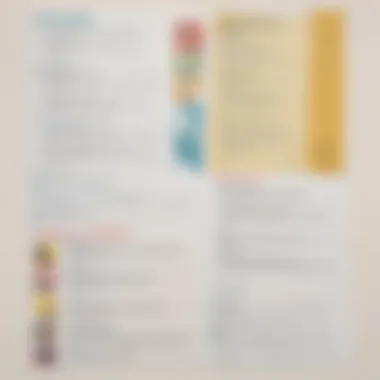Mastering Your CV: A Guide for the French Job Market


Intro
Creating a curriculum vitae, or CV, is a crucial step in pursuing a career in France. The French job market is unique, with distinct conventions and expectations regarding the content and layout of a CV. This guide delves into these nuances, offering essential insights for job seekers at any career stage. The aim is to equip you with both knowledge and tools that can elevate your application, making it stand out in an increasingly competitive landscape.
Understanding the French
Before embarking on the writing process, it is important to recognize the fundamental differences between a French CV and a CV tailored for other cultures. A standard French CV typically emphasizes clarity and professionalism. Unlike some countries where creativity is encouraged in CV design, the French prefer simplicity and directness. Your CV should convey this through a structured layout, typically limited to a single page.
Elements such as contact details, professional experience, educational background, and skills are vital. In addition, assisting the reader by highlighting personalized attributes that relate to the job is also pivotal. Recognizing these preferences not only serves to make your CV visually appealing but reflects a clear understanding of the expectations in France.
Key Components of a French
When crafting a CV for the French job market, consider incorporating the following components:
- Personal Information: Always include your name, address, phone number, and email. Including a photo is common in France, though emerging trends suggest that this practice is evolving. Beware, a neutral and conventional image is preferable.
- Professional Experience: Introduce your work history in reverse chronological order. Clearly outline your roles and responsibilities, making sure to adjust language based on the targeted job description.
- Education: List relevant academic qualifications starting from the most recent. If you've completed specialized training or courses, include them as well.
- Skills: Highlight any languages spoken and technical skills applicable to the position. Keep in high importance the skills directly related to your field of expertise.
With these rules in mind, your CV can effectively convey your qualifications in an impressive manner.
Cultural Considerations
Understanding cultural nuances is significant when writing a French CV. Emphasize certain cultural traits that may align with the company’s values, particularly focusing on a level of professionalism. Additionally, a basic understanding of French customs related to employment can positively affect perceptions during the hiring process.
This ultimate guide ensures you not only navigate the complexities of the French CV format but also integrate the soft skills that demonstrate your suitability for the role advocated in applications.
Final Tips
Understanding the Curriculum Vitae
The importance of understanding the curriculum vitae (CV) cannot be overstated. In the context of job applications, particularly in France, the CV is not merely a document summarizing a person's professional journey. It is a detailed representation of one’s qualifications, experiences, and unique attributes. An effective CV sets the stage for prospective employer to evaluate an applicant’s fit for a role. Different cultures have distinct expectations on how CVs should be formatted and what information is relevant. In France, there are particular norms that shape this document.
Definition and Purpose
A curriculum vitae, often referred to simply as CV, presents a detailed history of a person's education, work experience, skills, and other relevant details. The term originates from Latin and translates to "course of life." Unlike a resume, which is typically a brief one-page summary of skills and experiences, a CV can stretch to multiple pages to encompass all accomplishments and affiliations. Its primary purpose is to secure a post by showcasing qualifications and professional growth effectively. For job seekers entering the French labor market, understanding both defines of a CV and its particular usage in hiring contexts is paramount.
Differences Between Resume and
The distinction between a CV and a resume is pronounced yet nuanced, especially in the French context. Here are key points that underline their differences:
- Length: A CV is generally longer than a resume. While resumes typically limit themselves to one page, CVs provide comprehensive insights over multiple pages.
- Content: CVs delve into academic backgrounds, detailed work experiences, publications, certifications, and sometimes personal interests to present a complete picture. Resumes streamline information, focusing more on relevant work experiences and skills tailored to the job.
- Purpose: CVs serve not just job applications but academia, scholarly publications, and certain professional contexts; a resume is used primarily in job searching.
Understanding these differences is crucial for anyone seeking employment in France, enhancing the potential to create a CV that meets local expectations. Non-native speakers entering the French job market must pay careful attention to these elements to stand out.
Cultural Considerations in French CVs
Understanding cultural dynamics plays a crucial role in crafting an effective curriculum vitae for the French job market. The CV is not just a document; it's a reflection of their professional identity and cultural expectations.
Understanding the French Job Market
The French job market differs from many others, particularly with regard to job applications. Traditionally, a CV in France is seen as a pivotal component that complements the covering letter. It portrays one's skills, experiences, and qualifications succinctly. However, the approach should emphasize precision and personal relevance.
Companies look for candidates who can integrate well into their corporate culture. A tailored CV signifies respect for the employer's values, which can substantially improve job prospects. The competitive nature of the market often mandates that job seekers highlight strategic skills pertinent to the potential employer. Potential candidates must also acknowledge French norms, such as valuing education credentials and recent employment experiences more heavily than belongings or interests that may scatter attention.
Expectations from French Employers
French employers often anticipate clarity and professionalism in a CV. A typical approach can include:
- Clear structure, often using simple, categorized sections for easy readability.
- Offering a detailed educational background as the French value higher education qualifications highly.
- Certifications and specialized training are also strong points.
- Personal attributes like reliability, diligence, and precision are appealing to employers in France. They usually prefer candidates who demonstrate a clear career path, demonstrating commitment and growth in their professional journey.


Research into specific expectations is indicative of one's effort, suggesting thoroughness on the part of the job seeker. Employers appreciate candidates who have skillsets aligned with their specific sector and who can showcase adaptability. The CV should, therefore, spark a narrative of loyalty to company principles whilst showing the ability to contribute positively.
Essential Components of a French
Creating a successful curriculum vitae for the French job market hinges on incorporating several essential components. Each element serves a purpose not just for showcasing your qualifications but also for aligning with local expectations. Attention to these critical areas can significantly enhance your chances of making a strong impression on hiring managers.
Personal Information
Personal information is arguably the first step to establishing your identity within the CV format. In France, it is standard to include your name, address, phone number, and email at the top of the document. Some candidates also add their date of birth and nationality, but that might depend on the industry. Parsing this separately allows easy access and an immediate understanding of candidate identity.
Professional Summary
A professional summary summarizes your key qualifications, experiences, and aspirations. In a French CV, this section can significantly affect how your application is perceived. Aim to make it concise yet descriptive, illuminating your career trajectory and key competencies. The summary should echo the position you seek, demonstrating why you are a solid match.
Work Experience
This section lists your prior positions in reverse chronological order. Clearly specify the job titles, companies, and dates of employment. Describing your responsibilities and accomplishments in each role gives recruiters better insights into your skills. Focus on quantifiable achievements where possible, as they demonstrate the measurable impact you’ve made.
Employers value specifics, so include numbers, percentages, and clear examples to provide context.
Education Background
Just like work experience, education should be organized in reverse chronological order. Include degrees earned, institutions attended, and dates of graduation. If relevant, you may also include key courses, projects, or thesis topics. To align with French standards, mention academic distinctions or honors if applicable.
Skills and Competencies
This section should focus on specific skills that align with the job description being applied for. Divide these into hard skills and soft skills. Hard skills might include technical expertise or software proficiency. Meanwhile, soft skills could involve leadership and teamwork capabilities. Clear articulation of these competencies exemplifies both versatility and focus.
Languages Spoken
Considering the multilingual environment in which many companies operate, it is important to mention the languages you can speak. Start with your native language, followed by proficiency in other languages—indicating whether you are a beginner, intermediate, or fluent speaker. This focus can set you apart in exploratory teams, especially in France, where bilingualism or multilinguality is valued.
Formatting Guidelines for a French
Formatting a CV correctly is crucial in the French job market. Adhering to specific guidelines ensures readability and presents a professional image. A well-structured CV attracts attention and conveys your qualifications effectively. Each formatting choice impacts the reader's perception, emphasizing the importance of making informed decisions.
Font and Layout Choices
Selecting the right font and layout for a French CV contributes significantly to its effectiveness. Clarity is key. Use a simple, professional font. Examples suitable fonts include Arial, Calibri, or Times New Roman. These fonts maintain a clear and neat appearance.
The layout should facilitate easy navigation. Sections should be distinct but connected. Keep positive white space and align text left. Avoid overly ornate designs that detract from content. Bulleted lists help to present information clearly. Also, headings can aid in quickly identifying sections.
Important points for font and layout selections are:
- Font size should vary between 10 to 12 points for body text.
- Heading fonts can be slightly larger, around 12 to 14 points.
- Use bold for section titles and relevant fields but avoid excessive capitalization.
Choosing the right font and a user-friendly layout can better engage prospective employers. Flexibility in design is often preferred while respecting formality.
Length and Structure Recommendation
The length of your French CV impacts its effectiveness. A maximum of two pages is acceptable, but one is often more effective for entry-level positions. Ensure to prioritize the most relevant information, as hiring managers generally prefer concise documents.
As for structure, prioritize sections logically for the reader's ease. Here’s a suggested format:
- Personal Information
- Professional Summary
- Work Experience
- Education Background
- Skills and Competencies
- Languages Spoken
- References


Each section should follow a clear pattern. For instance, under work experience, list positions in reverse chronological order. Provide pertinent details such as role, location, and dates of employment.
Conciseness and readability are priorities. Section headers must be eye-catching. Each entry should be no longer than five bullet points. This structure respects local preferences for information delivery and aids readability across all document sizes.
Common Mistakes to Avoid
Creating a curriculum vitae (CV) for the French job market requires a certain level of understanding about common pitfalls. Identifying and avoiding these mistakes is crucial for achieving a refined and appealing document. This section will delve into two primary errors individuals often make: overloading their CVs with information and neglecting local customs. Addressing these mistakes can enhance the chances of securing a desirable position while reflecting professionalism and attentiveness.
Overloading with Information
When crafting a CV, less can be more. Overloading a CV with excessive information can confuse the reader and bury key qualifications. Several issues arise when applicants fail to curate their content efficiently.
First, cluttered CVs tend to lose the reader's attention quickly. Employers skim through a multitude of applications, so your document must present important details succinctly. Instead of listing every stage of your work history, highlight key positions and share relevant accomplishments.
Second, irrelevant or outdated information can harm the overall perception of your suitability for a role. For instance, including details from a job you held ten years ago that do not connect to your current skills may lead hiring managers to question your understanding of current market needs. Prioritize recent experiences that present skills applicable to the desired position.
It's beneficial to adopt strategies like:
- Selecting 2 to 4 relevant jobs.
- Keeping bullet points concise (about two lines each).
- Featuring only achievements that set you apart.
Ignoring Local Customs
In the French job market, localized practices shape how CVs are appreciated. Ignoring these conventions is a mistake that could diminish everything good in your CV.
Employers expect CVs to reflect specific formats and customs. For example, using a standard photo of yourself, including a summary of personal interests, and mentioning your marital status define French CV norms. Failing to follow these details may signal cultural disinterest or a lack of research.
To adhere to local custom, consider the following:
- Photo preference: Many recruiters appreciate professional images on CVs.
- Content structure: Ensure the traditional reverse chronological format is maintained.
- Application discrepancy: Align wording and terminology to be more relevant to French industries and jobs.
strong>Ignoring expectations in style and presentation leads to negative impressions.strong> If your CV does align with custom practices, you risk underrepresentation of talents and qualifications.
Ultimately, familiarity with French CV traditions can enhance your appeal to potential employers. It shows that you have taken the time to understand the nuances associated with applying in France, thereby making your application more competitive.
By understanding these common mistakes, you can navigate the French job market with confidence, better showing your qualifications and abilities.
Tailoring Your for Specific Positions
Crafting a standout CV requires more than just listing your qualifications. Tailoring your CV for specific positions is crucial in illustrating your suitability for the role. Each job you apply for is distinct, and your CV should reflect that recognition. By adapting your application to align closely with the job description and the company culture, you achieve a deeper engagement with employers.
This process offers several benefits. First, it enhances the clarity of your qualifications. Secondly, personalization allows you to highlight the most relevant experiences and skills. Employers appreciate candidates who demonstrate an understanding of their organization and its values. Tailoring a CV also emphasizes your attention to detail, which reflects well on your candidacy.
Considerations include the required qualifications and skills mentioned in the job posting. Use relevant language to express how your experiences address these needs. Reviewing various job descriptions can help identify common themes in the expectations. That will better position your CV for maximum impact.
Researching Potential Employers
Researching potential employers is the first step in customizing your CV. To create a tailored CV, it is essential to understand the specific values, goals, and current market position of the company. Begin by reviewing the organization's website, paying special attention to their mission statement and recent press releases. Public reviews and articles can offer insight into workplace culture.
Seek to understand their core products or services. Explore their competitive landscape. This knowledge will guide you in emphasizing relevant skills and experience in your application. Join forums and discussion groups on platforms such as reddit.com to gather opinions from employees and peers about the company's working conditions and ethos.
Adapting Content to the Job Description
Adapting content to the job description is a critical task. Pay close attention to crucial phrases in the listing. Highlight experiences and skills directly cited in the description within your CV. This requires a thorough match of your skills to their expectations.
Break down the job description. Identify specific skills and qualifications they prioritize, and position those prominently in your CV. If the description mentions teamwork, include a relevant experience demonstrating your collaborative skills.
Start with a strong professional summary that matches the overall tone of the job role. This will immediately resonate with hiring personnel. Structure the detail of your work experience to fit the qualifications emphasized. Always remember, a well-customized CV reflects that you are positively engaged and serious about the role you seek.


In tailoring your CV, take the time to invest in researching and adapting your content; this signals sincerity and commitment to potential employers.
Ultimately, tailoring your CV for each specific position displays an intention behind your application. This approach can strengthen your candidacy and increase your chances of landing an interview.
Examples of Effective French CVs
Understanding Examples of Effective French CVs
Examples of effective French CVs provide critical insight for aspiring job candidates who wish to navigate the French job market successfully. By examining real-life instances, candidates can gain a clear sense of expectations and showcase their qualifications appropriately. With a focus on structure, formatting, and careful consideration of content, a CV can be an influential tool in a job seeker's strategy. Learning from what works can simplify the often daunting process of CV creation, helping to incorporate specific elements that draw the attention of recruiters.
Entry-Level Example
An entry-level CV in France typically emphasizes education, internships, and relevant skills over extensive work experience. Here are the key elements to consider when crafting this kind of CV:
- Personal Information: Include your name, contact information, and location. In France, it’s common to add your age or date of birth, as well.
- Professional Summary: Provide a concise overview of your academic background and skills, aligning them with the job role you are applying for.
- Education: Highlight your degrees and certifications, starting with the most recent. Detail relevant coursework, especially if you lack extensive job experience.
- Internships: List any internships you have completed that relate to the job description. Focus on specific tasks and achievements, as this communicates your potential.
- Skills and Competencies: Emphasize soft and hard skills. Computer skills, language proficiency, and teamwork experience are valuable in an entry-level position.
- References: It’s acceptable to simply write
Utilizing Online Resources for Creation
In the digital age, creating an effective curriculum vitae (CV) must include online tools and resources. These platforms can greatly enhance the quality and presentation of a CV, making it visually appealing while ensuring that content is effectively conveyed. By utilizing online resources effectively, job seekers can save valuable time and ensure that their CV meets high standards.
One of the crucial benefits of online resources is the accessibility they provide. Many services offer templates that align with professional norms in France, accommodating the specific requirements of the French job market. Candidates can find inspiration, ideas, and formatting suggestions directly suited to their target sector. This creates an edge over applicants using generic CV formats.
Additionally, incorporating feedback tools available on various platforms allow users to receive critiques from peers or professional resume builders. This iterative process is invaluable for refining a CV's clarity and impact. Likewise, professional connectors on certain late sites may offer job leads that come with assessments of your CV. Thus, these avenues enhance not just the CV but job prospects as compiler too.
Online Builders and Templates
Using online CV builders significantly simplifies the process of creating a French CV. These platforms typically provide pre-designed templates tailored for various sectors. Users can select a template that fits their professional identity. Another advantage is that these tools often incorporate guidelines about typical content expected. For instance, detailed sections for work experience or languages spoken are indicated.
Online tools remove the guesswork that often leads to a CV being ineffective. Most builders guide the user through necessary steps; prompting for educational background or specific skills related to the job description in French. Some reputable sites include Canva and Zety. Their intuitive interfaces make customization easy, ensuring a polished final product.
Advantages of Online Builders
- Variety of Templates: Wide selection accommodates different careers.
- Customization: Easily modify text and sections to reflect personal experience.
- Tips and Guidance: Often provides writing tips tailored to format chosen.
Professional Networking Sites
Using professional networking sites, such as LinkedIn, is crucial in modern job search. These platforms help individuals connect and engage with potential employers. An effective profile acts similarly to a CV, showcasing skills, networking opportunities, and endorsements from peers. A well-crafted online presence can catch the attention of recruiters actively seeking new candidates.
Many users choose to upload their CV directly or create a profile that acts like a living CV. To create optimum search visibility, it is important for individuals to align their online profiles closely with the language of their CV. Relevance in notice can significantly improve chances during automated searches done by companies.
Key Points of Engagement on Professional Networking Sites
- Profile Update: Regularly update your profile to reflect recent accomplishments.
- Networking: Connect with industry professionals; engagement may lead to hidden job opportunities.
- Participation: Engage in relevant discussions, increasing your visibility as a knowledgeable candidate.
Research shows that 85% of jobs are filled through networking.
Finalizing and Submitting Your
Finalizing and submitting your CV is a crucial step in the job application process. This final phase not only determines if you present your credentials effectively but also influences the initial perception an employer has of you. Getting these aspects right increases your chances of passing the recruitment threshold. Candidates should approach this stage with a keen eye for detail, emphasizing clarity and professionalism.
Proofreading and Editing Tips
The first essential tip for proofreading and editing your CV is to take a break after writing. This allows you to return to your document with fresh eyes. Here are some steps to consider:
- Read Aloud: Reading your CV aloud can help identify awkward phrases or grammatical mistakes that might be overlooked in silent reading.
- Check Formatting: Ensure that your formatting is consistent throughout the document. Check for the same font style, size, and spacing in all sections.
- Consistency in Verbs: Use either past or present tense consistently when describing your experience and education. This creates a strong, unified narrative.
- Get a Second Opinion: Sometimes, others can spot errors or suggest improvements that you may have missed.
- Specific Details: Verify all the details in your CV, including job titles, company names, dates of employment, and educational qualifications.
These editing tips not only improve the overall quality of your CV, but they also enhance your credibility as a candidate.
Attention to detail is a reflection of professionalism.
Best Practices for Submission
After finalizing your CV, the way you submit it can considerably affect the outcome. Here are a few suggested best practices to remember:
- Follow the Application Instructions: Pay close attention to the specific submission guidelines provided by the employer. Whether they prefer email submissions or online application systems, numbering your attachment—like















